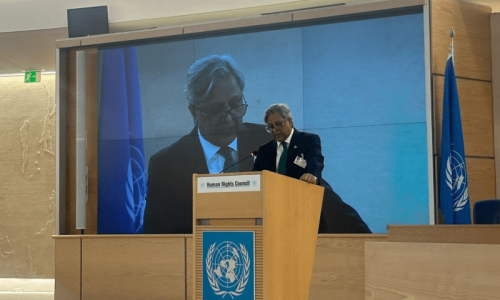 BAROUK (Lebanon): Lebanon’s majestic cedar trees have withstood the test of time for centuries but climate change is threatening the country’s most treasured symbol.
BAROUK (Lebanon): Lebanon’s majestic cedar trees have withstood the test of time for centuries but climate change is threatening the country’s most treasured symbol.
Used by various civilisations throughout history for their strong and durable wood, Lebanon’s cedars are now on the International Union for Conservation of Nature’s Red List as a “heavily threatened” species.
Local experts and environmentalists warn that global warming could have a negative impact on the cedars.
“Enough talking about the need to preserve the cedars, it’s time for action. We must preserve the trees now,” said Nizar Hani, scientific coordinator of the Al-Shouf Cedar Nature Reserve in the mountainous Shouf area southeast of Beirut.
“All indications are that if the current climatic changes continue, the cedars could be in danger.”
Lebanon’s largest reserve, where 25 per cent of the country’s 2,000 hectares (nearly 5,000 acres) of cedar trees are located, was established in 1996, stretching from Dahr al-Baidar in the north to Niha Mountain in the south.
Some of the reserve’s cedar trees, which belong to the pine family and have needle-like leaves bearing seeds in scaled clusters, are estimated to be 2,000 years old.
“The melting of snow on mountains as a result of climate change would lead to the disappearance of the cedars in Lebanon,” said Wael Hmaidan, executive director of the League of Independent Activists, or IndyAct, a non-governmental organisation which focuses on environmental issues.
“We need to tackle climate change and limit its effects before it’s too late.”
Snow is a must for the tall evergreen cedars, which have a natural range of 1,200-1,800 metres (4,000-5,900 feet) above sea level. Warmer temperatures would push the trees higher up in order to grow and develop.“If there is no combination of rain, snow and frost for several consecutive days, the seeds of the cedar won’t be disseminated. We also need cold treatment for the seeds to be able to germinate,” said Fady Asmar, a consultant and expert in Mediterranean forests.
“They also need summer mist, which compensates for water needs. Any change in these conditions for several consecutive years might eventually lead to the death of trees.”
Lebanon’s cedars were heavily deforested for thousands of years, and the remaining trees are now kept in protected areas.
Deforestation accounts for around a fifth of global emissions of heat-trapping greenhouse gases.
It is said the Phoenicians used cedars for building trade and military ships, as well as houses and temples, while their resin was key to the ancient Egyptians for mummification.
It is also believed that King Solomon’s Temple in Jerusalem was built from Lebanon’s cedars, which were designated as the dwelling of the gods in the Sumerian epic of Gilgamesh.
Three other species of cedar exist in Turkey, Cyprus, Morocco and Algeria as well as Afghanistan and India.
“The rainy season was bad this year. We can’t easily control climate conditions,” said Hani.
Drought was blamed for the infestation of a wood wasp called Cephalcia Tannourinensis that ravaged cedars in Tannourin village in northern Lebanon several years ago.
“This (wasp) lives with the cedars in the same environment. But warm weather and rising temperatures have extended its life cycle from once a year to three times a year, leading to the problem of Tannourin,” said Hani.
“Such pests become very active when temperatures increase.”While Hmaidan warned that global warming could “transform Lebanon into a desert,” Asmar said the effects of climate change in the long run can not yet be measured.
“Unfortunately, Arab countries are not exerting enough efforts like the rest of the world to face climate challenges,” Hmaidan said.
“They are not considering their long-term interests and do not realise the dangers of climate change which might transform Lebanon into a desert.”
However, Asmar said there was not enough data available to sound the death knell of the trees at this time.—AFP












































